Develop Your Internal Locus of Control: 4 Tactics to Become the Master of Your Reality
Where is the good? In our choices. Where is the evil? In our choices. Where is neither of them? In those things we do not choose. – Epictetus, Discourses
In life, it’s so easy to feel helpless.
After all, there’s all of these things are happening and you (seemingly) can’t do much about it.
Stock market crashes, pandemics, protests, elections, crimes, all sorts of things are happening “out there”. Of course the news doesn’t make it any better. They emphasize what you don’t have control over (which is all the things I’ve just listed).
But what can you control – really? Well, it turns out…a whole lot.
But you won’t see that unless you have a strong internal locus of control.
This article’s going to be diving into how you can develop an internal locus of control so you can control the controllable and leave the rest “up to the gods”.
[toc]
What is a Locus of Control? (Internal vs. External)
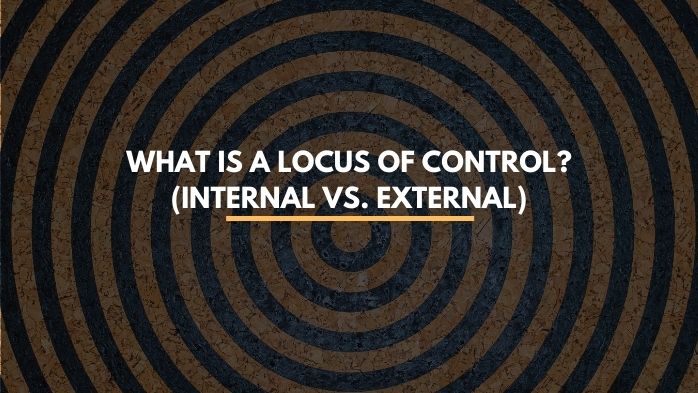
Your locus of control is a psychological barometer that measures how much control you feel as if you have over your life (kinda obvious). This affects many areas such as your level of self-confidence, initiative, and your ability to change over time.
Generally speaking, your locus of control is mental paradigm or the lens through which you view life – AKA your worldview.
People with a strong internal locus of control believe that they can make a tangible difference in the world through their own actions. These are the guys you see doing things like volunteer work, learning new skills, and making efforts to better themselves and the environment each day.
People with an external locus of control see things “out there” as wholly responsible for their success (or lack of it). These are the people who say “the world is going to hell” because they watch the news every day or the people who wait for things to happen to them. They are passive.
It’s worth knowing that this is a spectrum or a scale. No one is completely 100% in charge of every aspect their life.
The truth, like most things, lies in the gray nuances.
The Nuanced Truth About Life (and How It Affects Your Actions)
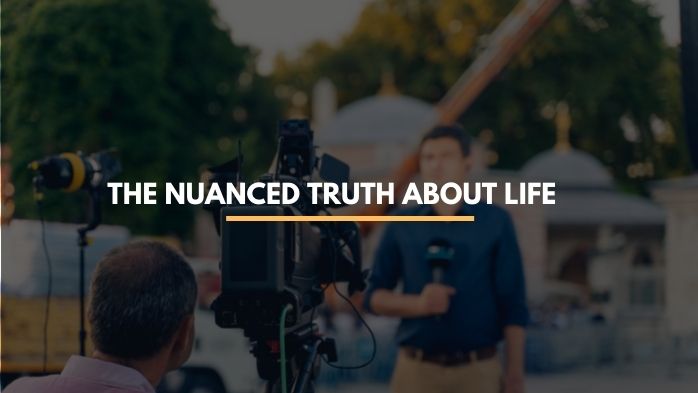
Life is a funny thing… It’s “funny” because we all have different definitions of what “life” is. However, not so hilarious is the fact that we have multiple people and sources tell us what “life” is. Like “the news” for example.
If you ask the average person you see walking on the street what “the news” is, they’ll say:
People who tell you what’s going on in the world.
But how accurate is that?
When you think about what the news actually is, it’s a curated collection of events. The key word in that sentence is curated. As in, carefully selected.
Sure, the news shows you what’s going on some of the time in some places in the world. But it conveniently forgets the bigger picture.
The bigger picture being: the world isn’t as bad as you think it is and it’s actually getting better.
But you’ll never see that in most places.
Why Does This Matter?
By believing that your luck or fate lies solely (or mostly) outside of you, you forfeit your ability to influence your life.
The average American spends up to 11 hours a day interacting with different forms of media in the form of:
- TV
- Social media
- Videos
- Phones
The list just goes on and on. And guess what?
Most of the things people interact with on the Internet are negative.
Negative stimuli have a dampening effect on your ability to take action.
Why would you take action and do anything if the world is terrible and you can’t do anything at all to change it? After all, you are what you eat.
But we’re not done yet.
The form you have selected does not exist.
Understanding Your Areas of Influence
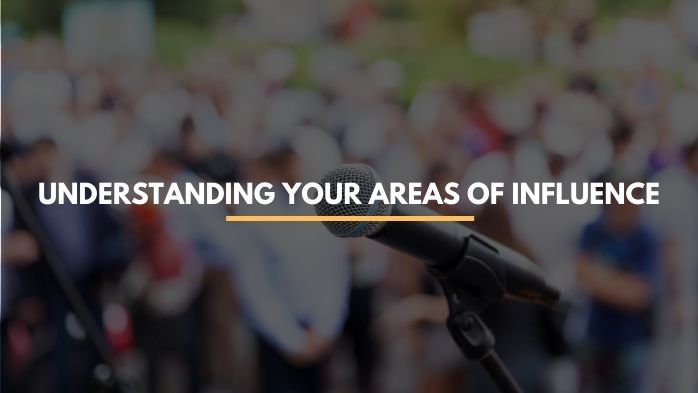
In order to develop a strong internal locus of control, we need to ask:
What can I affect in (my) life?
The addition of “(my)” is important. If you look at “life” as just a giant thing that you exist in, then yeah, there’s not too much you can really do. But when you add the word “my”, you start asking how you can control the things you interact with on a daily basis.
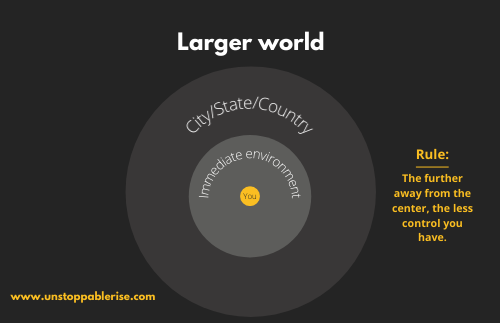
If we look at this picture above, we see that there’s a massive world happening outside of us, so much so that we look almost insignificant.
But then we hone in further and see that there’s many things in our orbit of indirect influence.
Then we zoom in even closer on what we can control – almost directly.
And when you look at your life from that perspective…you see there’s a bunch of things you have influence over. Such as:
- What time you wake up in the morning
- The energy you bring to interpersonal relationships
- When and how long you practice certain things
- Whether or not you go to the gym
- Etc…
So much stuff. And that’s just scratching the tip of the iceberg.
So yeah. That small area matters. A lot.
Ok, so we know what we have influence over. How do we start to influence it and develop a better internal locus of control?
How to Develop a Strong Internal Locus of Control
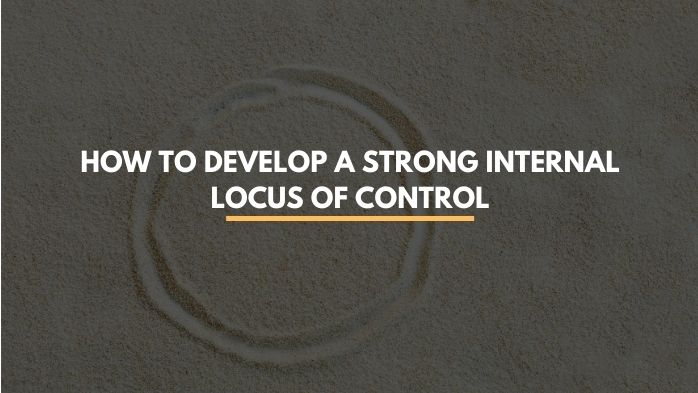
There’s many ways to develop a higher levels of internal locus of control, but here’s a few basic ones.
Reorient Your Relationship with the World
Many of us have been raised to believe that the world is a competitive place and that you need to look to other people to give us validation.
And some of that may be true.
There are other people who want the things you do (creating competition) and there are other people who will seemingly be “ahead of you”, so to speak.
But what is the truth? The truth is, the only person you’re really competing against is yourself.
Think about it. In self-development, you get better than who you were the previous stretch of time.
There is no other way to measure progress.
If you set yourself as the standard, you set yourself up for a fair game.
When other people are the standard, you are by default playing a lopsided game. It’s like someone who’s 6’7“ playing basketball against someone who’s 5’4”. The game is rigged. There will always be someone “better” than you. And you in turn will always be “better” than someone else.
Viewing yourself as your own competition is not the “standard” way to view the world. But it is the only real way to start developing a strong internal locus of control and mental health.
If you set yourself as the standard, you set yourself up for a fair game. When other people are the standard, you are by default playing a lopsided game. Share on XBuild Your Foundation
If you want to develop a strong internal locus of control, you need to nail the fundamentals. The fundamentals are your foundation. The foundation is where you build your self-image and identity from.
That means getting things right like:
- Your diet
- Your exercise routine
- Your sleep schedule
- Your self-talk
- Your habits
All of these things will help point your life in a more desirable direction. Developing a strong internal locus of control requires mind management.
Change Your Behavior
At the root of all of the things I just mentioned (and developing an internal locus of control) is behavioral change. Behavioral change is the process of changing your disposition and responses to stimuli from life.
Because if you think about it, there’s no one to change but yourself. All of your responses to life are dictated by your internal programming and inner conversations.
If you want life to reorganize itself for you, you need to change how you respond to it. And that starts with changing yourself.
There’s deeper implications than this, but that’s enough to get started.
You need to start with small wins.
One of the best ways to start changing your behavior is to think in terms of your self-image. To learn how to change this, check out Psycho-Cybernetics: An Indepth Guide On How to Use and Apply For Massive Success.
Begin With Small Wins
As you continue to layer small changes on top of one another, the scales of life start to move. Each improvement is like adding a grain of sand to the positive side of the scale, slowly tilting things in your favor. Eventually, if you stick with it, you hit a tipping point. – James Clear, Atomic Habits
You need to have subconscious internal buy-in that
“yes, I am responsible for a large amount of my life and if I want a different result, I need a different action”.
You can get to that point where you solely and truly believe that. I know this because I’ve done it.
However, since you’ve been programmed in so many ways to be a victim in your life instead of a victor, you will subconsciously resist this.
You need to start with small wins. And by small, I mean tiny. Almost to the point of insignificant.
Why?
Because tiny:
- Is repeatable
- It stacks
- Has little willpower involved
Do something small like reading 10 pages of a good book every day. Will this dramatically change your life? Definitely not. But over time, it. adds. up.
Then you look back a year, 2 years, 5 years, and you’re in a completely different place and most importantly, you’ve convinced yourself that change is possible over certain periods of time.
The book Atomic Habits is all about this concept.
Conclusion + Wrapping Up
There’s a lot of stuff in the outside world that will make it seem as if you don’t have any control over your life, but that’s not really true. There’s a lot that you do have effect over directly or indirectly. People who have an internal locus of control believe this, while people who have an external locus of control don’t.
You can become the former by changing how you see the world, building up your ability to change your life, changing what you do on a day-to-day basis, and proving it to yourself with smaller wins.
Over time, you will truly become the master and commander of your personal reality.
What do you think about this concept? What areas do you have a stronger internal locus of control over compared to others? Let me know in the comments.
The form you have selected does not exist.
